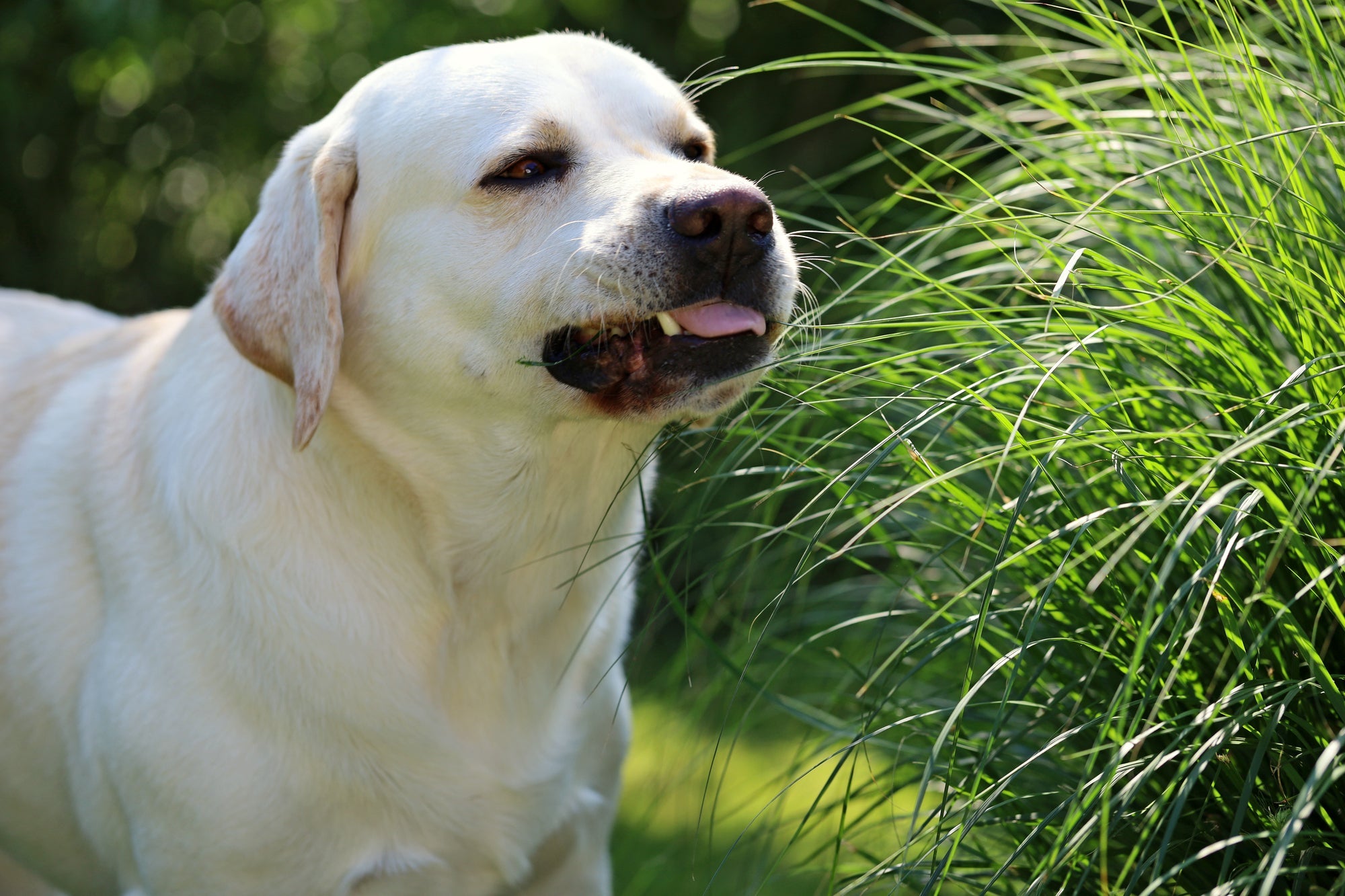If you notice your dog munching on your pristine lawn, should you worry? Has your dog suddenly turned into a cow or is there more to it?
Dogs eating grass is actually common. Both dogs and cats will eat grass, although the reasons can be different.
It isn’t usually anything to worry about as long as the grass isn’t treated and it becomes excessive.
Why do dogs eat grass?
First, let’s bust a myth. Dogs don’t eat grass for the same reasons cats do.
Cats will eat grass to get rid of hairballs or to help with an upset stomach.
The popular belief is that a dog doesn’t do that for the same reasons. For one, dogs don’t seem smart enough to equate eating grass to being sick and then feeling better.
There are a number of reasons we think dogs eat grass:
The grass looks tasty
Let’s be honest, even humans like the look of a lush green lawn. Especially first thing in the morning with fresh dew on it!
While we wouldn’t dream of munching on it, dogs don’t have the same social conditioning and willpower.
The grass may just look tasty and provide another source of moisture, which is why they eat it.
Grass can be nutritious
While the average dog has no idea about nutrition, some part of their instinct may tell them that grass is a good source of something.
We’re not quite sure how that instinct works but it’s at the core of all our beings. There’s no reason to think otherwise for a dog.
Your dog may lack nutrition in their own diet. The body is an amazing thing and can detect when it lacks something and then somehow identify foods that contain what we’re missing.
Dogs and other animals can do the same.
Your dog could be bored
Eating grass is an observed behaviour in young dogs and could be a sign of boredom. Like digging or chewing, a dog can manifest boredom in a number of ways.
Eating grass is one of them.
While boredom eating is less harmful than digging or chewing, if you leave it unchecked, it becomes a learned behaviour which can gradually become worse.
Dogs are scavengers
In the wild, and often in the home, dogs scavenge food. They are natural scavengers and will find food wherever they can, whenever they can.
Eating grass could just be a part of that.
They may genuinely like the taste. They may have eaten grass once that had meat juice or something on it and they associate grass with that taste. We just don’t know.
Stomach upset or gastric distress
While unlikely as far as we can tell, your dog may have an upset stomach or feel sick. Both vets and dog trainers consider this the least likely reason, but it is definitely possible.
Dogs tend not to be sick after eating grass like cats, which is one of the reasons we don’t think this happens too often. They can be sick afterwards, but not always.
However, if you notice other changes of behaviour, it may be worth checking further.
Should you stop your dog eating grass?
The answer to this question depends on how often your dog eats grass and what type of grass they are eating.
If it’s just occasionally, there is no danger from eating grass as long as your dog doesn’t try to do it when you’re mowing the lawn.
If they are eating grass all the time or it seems to be an obsessive behaviour, that may require intervention.
If they are eating grass you know is treated with pesticides or herbicides, you need to stop them right away. Redirect it to safe grass if you have to, but get them away from treated grass.
How to stop your dog eating grass
There are a few ways you can stop your dog eating grass without telling them off.
Keep your dog occupied or tired
A tired dog is a happy dog. Exercise it more, play with it more and engage with it more. If it's boredom driving the behaviour, this can be enough to stop it.
If it’s just something to do while waiting for something else or a minor learned behaviour, being tired should remove the urge to eat it.
Change the dog food or add a supplement
If you don’t think your dog is bored, try changing their food or adding an extra plant-based ingredient.
Careful when changing food. Replace it gradually so your dog becomes used to the new food and their gut adapts. The same for adding a supplement or extra ingredient.
If they are lacking something nutritionally, this could be enough to stop them eating grass.
Training and positive reinforcement
Unless there’s an underlying cause of the grass eating, you should be able to redirect the behaviour and train your dog out of it.
Use positive reinforcement, treats and your usual training tricks to redirect the dog to something else and stop them eating the grass.
Dogs eating grass
As long as the grass your dog is eating isn’t treated with chemicals and the behaviour isn’t obsessive, it’s usually harmless.
Animals eat grass and probably always have done. As long as they don’t do it all day long and aren’t missing something in their diet, it’s usually safe.
If in doubt, discuss it with your vet and get an expert opinion!

